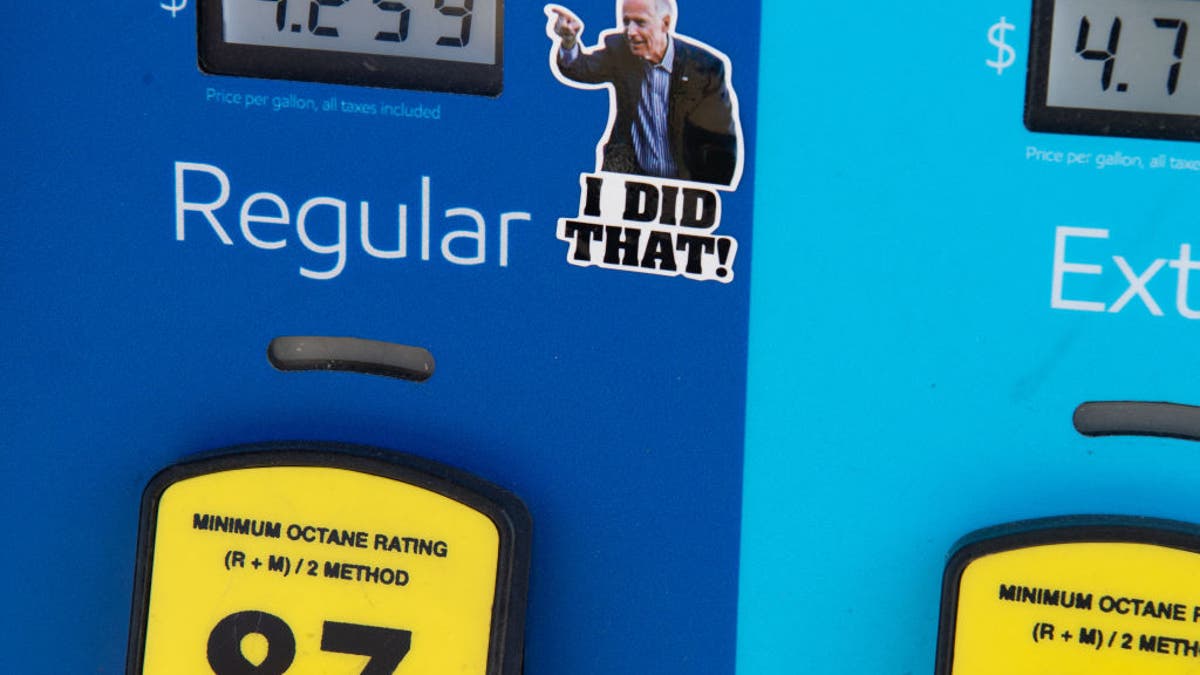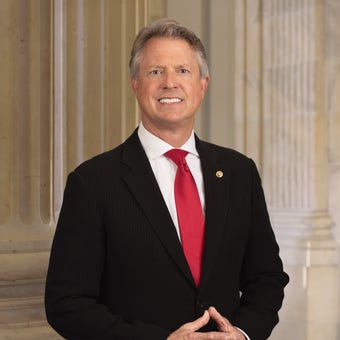Media react to skyrocketing March inflation: 'This is crippling politically'
Media personalities reacted to the new March inflation numbers on Tuesday, which saw a 1.2% increase from February.
The ongoing inflation crisis is making Americans sicker—and just when we are coming out of the COVID-19 pandemic.
For more than two years, the COVID-19 pandemic has placed a devastating strain on the American health care system and its patients—our family, friends, and neighbors. Hospitals reassigned resources to care for patients with severe COVID-19 and non-COVID-19 emergencies only. At the same time, patients put off seeing their doctors—scared in large part by the portrayal of the pandemic on the news.

A gas pump displays current fuel prices, along with a sticker of President Joe Biden, at a gas station in Arlington, Virginia, on March 16, 2022. (Photo by SAUL LOEB/AFP via Getty Images)
At the beginning of the pandemic, these responses may have been reasonable. But this approach went on for far too long—bolstered by fear and political posturing—with too many policymakers failing to offer a strategy for safely returning to a more normal life.
The downstream effects have been disastrous for many Americans. Founding Father Benjamin Franklin once said, "an ounce of prevention is worth a pound of cure." Not only that, but it is a much cheaper form of health care delivery too. But COVID-19 shifted our attention away from this commonsense strategy, and we are paying the price for shortsightedness now.
Today, as a result of those policies, we have an enormous backlog of patients seeking routine medical care. We cannot see patients fast enough.
On one side are those who missed routine blood labs, medical tests, or were simply unable to receive care over the past two years. In fact, 1 in 5 Americans delayed or were unable to receive medical care during the pandemic. Many suffered negative health consequences, including becoming sick with preventable diseases or cancer that could have been caught earlier. Not only does this cost the health care system more, but more importantly, the human suffering is heart-wrenching to witness—especially because we could have avoided the suffering.
Equally troublesome are the large number of young and old patients who did not receive preventive care, like annual check-ups or routine vaccinations during the pandemic. Today, these patients still need their preventive care, but they face even more barriers to receiving such care because of the backlog of patients and lack of resources to "make up the difference."
As COVID-19 numbers improved and the nation learned to live with the virus, we hoped to see a resurgence of preventative health care visits and re-creation of the sacred patient-doctor relationships for those who had missed clinic visits during the pandemic. The two groups of patients need care, and it seemed like now would be a perfect time to seek it. But progress in seeing all of these patients has been limited despite the pent-up demand.
Why? Inflation.
We hear about it on the news, but everyday Americans feel inflation at the kitchen table, in the grocery line, and at the gas pump. Inflation is the biggest tax on the middle class in decades, and the worry is real. It is no wonder that nearly 6 in 10 Americans believe the economy is getting worse and over one quarter believe inflation is the most urgent issue facing the United States.
But what does inflation have to do with America’s health?
With consumer prices rising a steep 8.5 percent since last March, Americans worry about the economy and putting food on the table. Our brothers and sisters try to stretch their dollars to make ends meet. This means less money left over to pay for medical care. Seeing the doctor for what appears to be a non-emergent health issue—like a mild cough, stomach pain, or even a medication adjustment—becomes even harder when inflation eats into our finances. There is simply less money left over to pay for medical care. In the face of the financial pressure historic inflation creates, routine health care becomes secondary again to the daily struggles. In many ways, this is the same situation that occurred at the height of COVID-19 when all health care was focused on the virus.
The sad reality is we see the toll of inflation in the emergency department every day. While patients used to go to the clinic without a second thought for assurance and treatment, patients now come to the emergency department when the pain becomes too severe or the symptoms too worrisome to ignore at home. The conversations with these patients are emotional, and they show us as physicians that inflation is making Americans sicker. And while we as physicians are called to heal, there is no prescription we can write in the emergency department to cure the disease of inflation.
CLICK HERE TO GET THE OPINION NEWSLETTER
Some may see inflation’s impact on health care and argue for larger government programs like "Medicare For All" or initiatives focused on putting more Americans on traditional Medicaid. These are undoubtedly the wrong approaches. Attempting to pay for programs like this would require unrealistic and unsustainable tax hikes, compounding Americans’ financial strain by taking away even more of their money. If the government attempted to expand these programs without raising taxes for the sake of political expediency, it would have to print more money to pay for health care—an approach that would further worsen inflation.
CLICK HERE TO GET THE FOX NEWS APP
Instead of growing government, we should address the inflation crisis while refocusing our health care system on patients, not programs. The only sustainable solution is to reinvent our health care system through real competition (for example, via price transparency) and alignment of incentives across stakeholders.
By causing a delay in care, inflation is crippling our health care system just when it was poised to be rebuilt following the height of the COVID-19 pandemic. It is costing our country and our health care system more money when we do not have it, and it is making our fellow Americans sicker. We must address inflation and fix health care delivery with proven solutions that align incentives, foster competition, and focus care back on the patient-doctor relationship.
David N. Bernstein, MD, MBA, MEI is a resident physician at the Harvard Combined Orthopaedic Residency Program at Massachusetts General Hospital, Brigham and Women’s Hospital, Beth Israel Deaconess Medical Center, and Boston Children’s Hospital.
Jonathan R. Crowe, MD, MPH, MSc is a resident physician in the Mass General Brigham Neurology Residency Program at Massachusetts General Hospital and Brigham and Women’s Hospital.













































